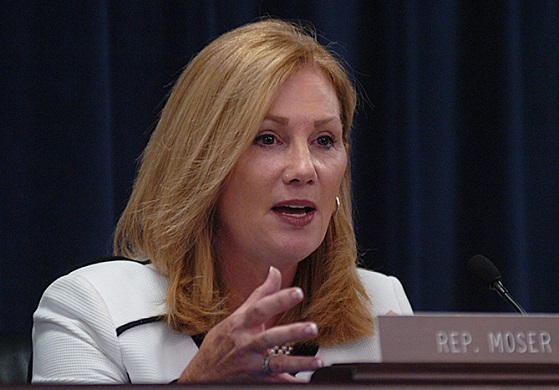
FRANKFORT, September 14 -- Rep. Kimberly Poore Moser, R-Taylor Mill, asks a question about a proposed medical marijuana bill for the
2019 Regular Session of the General Assembly during the Interim Joint Committee on Licensing, Occupations, and Administrative Regulations.
FRANKFORT, KY – A drug policy advisor for three former presidential administrations cautioned state lawmakers Friday about legalizing medical marijuana
"As somebody who has studied this as a social scientist for over 20 years, my position is unequivocal that we should not legalize marijuana," said Kevin Sabet, while testifying before the Interim Joint Committee on Licensing, Occupations & Administrative Regulations. "We have a hard enough time with our legal drugs."
If Kentucky lawmakers were to legalize medical marijuana, Sabet said they should study Louisiana. He said that state's very restrictive law has reduced problems associated with marijuana such as underage use, workplace accidents and impaired driving. Sabet added that New Jersey and New York also had some restrictive laws before liberalizing them.
"I would say look south and east rather than west," said Sabet, who is also an assistant professor at the University of Florida where he serves as director of the school's Drug Policy Institute. His and Kentucky Society of Addiction Medicine President Michael Fletcher's testimony was, in part, a rebuttal of individuals who spoke in favor of proposed medical marijuana legislation at the committee's Aug. 24 meeting.
"As an addiction medicine physician, I'm here to champion the implementation of safeguards in all jurisdictions where marijuana has been legalized or may be legalized in the future," said Fletcher. "My comments today reflect the public policy position stated by American Society of Addiction Medicine."
He said the organization, known as ASAM, does not support the legalization of marijuana.
Committee Co-chair John Schickel, R-Union, asked Sabet whether states with legal medical marijuana have seen an increase in residents filing for disability. Sabet said he has heard anecdotal stories about jumps in the number of people on disability rolls, but he hasn't seen scientific data to back up the claims.
"There has not been a good look at a lot of the data," Sabet said. "We have to scrounge around to find even use data that is relevant."
Sen. Christian McDaniel, R-Taylor Mill, asked what liability a small employer like him would face if an employee caused an accident while on medical marijuana.
"I don't have a crystal ball on how this will affect it," Sabet said, adding that he isn't a lawyer. "I can tell you in other states there is a mishmash of lawsuits that have happened.”
Rep. Kimberly Poore Moser, R-Taylor Mill, asked whether there was a field sobriety test, or quick method, to determine whether someone was actively under the influence of marijuana.
"There are tests in development," Sabet said. "We do not have anything near what we do for alcohol."
House Speaker Pro Tempore David Osborne, R-Prospect, asked if any state had repealed laws liberalizing marijuana use. Sabet said Alaska repealed an early marijuana law before a ballot initiative in 2014 made it legal.
"I think you have states going through this debate and discussion," Sabet said of whether anyone is currently considering repeal measures.
Senate Majority Caucus Chair Dan "Malano" Seum, R-Fairdale, said he is an advocate of medical marijuana who smoked it to relieve nausea after cancer surgery. He said regulating it would help ensure people were not purchasing marijuana laced with other drugs on contaminated with heavy metals or pesticides.
"When is the last time we heard of anybody getting hold of rotgut whiskey?" Seum said in reference to the watering down alcohol with poisonous chemicals like turpentine, common during Prohibition. "It doesn't happen because you can go to a store and get a clean product. You know what you are buying."
Sabet said he sympathizes with anyone in situations similar to Seum's.
"I don't think anyone wants to see adulterated products," Sabet said. "I worry about the legal stores in Colorado who are getting away with selling a lot of adulterated products. I also worry about the black market that is selling adulterated products."
Schickel said he expects some type of marijuana legislation to be introduced in during the upcoming session set to start on Jan. 8.
-- END --









